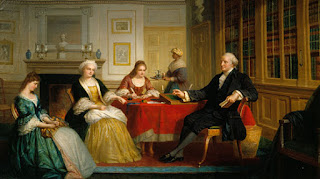 Martha Washington, the wife of President George Washington, often recalled the two saddest days of
her life. The first understandably was
December 14, 1799, the day her husband died. The second was in January 1801. This
was not because of a death but rather a visit from founding father Thomas
Jefferson. As a close friend explained, "She assured a party of gentlemen, of which I was one. . .that next to
the loss of her husband" Jefferson's visit was the "most painful
occurrence of her life."
Martha Washington, the wife of President George Washington, often recalled the two saddest days of
her life. The first understandably was
December 14, 1799, the day her husband died. The second was in January 1801. This
was not because of a death but rather a visit from founding father Thomas
Jefferson. As a close friend explained, "She assured a party of gentlemen, of which I was one. . .that next to
the loss of her husband" Jefferson's visit was the "most painful
occurrence of her life."
But why of all things would that be such a terrible day? You see, she had come to dislike Jefferson
for his frequent attacks on President George Washington. Attacks that came from
newspapers Thomas Jefferson ran solely to slander George Washington, which he
funded with Federal money. Money that he
got from his position as Secretary of State, on George Washington's cabinet! Martha Washington felt that any positive things
that Jefferson said or did in his memory were insincere and sarcastic.
The saddest part of
this whole endeavor was that Jefferson really didn’t dislike Washington. His real problem was with Alexander Hamilton.
Jefferson believed Hamilton, along with his Federalists, were bent on restoring
a monarchy in the United States. Because
Washington refused to completely dismiss the counsel of Hamilton, he believed
that Washington had fallen completely under their spell. Jefferson used his
press to paint Washington as a monarchist bent on destroying the rule of the
people and a senile follower of the policies of Alexander Hamilton. His beef with
Hamilton spilled over to George Washington and then brought Martha to such
pain.
Things like this are
not just reserved for politics however. How many good relationships have turned
sour because we let our personal disagreement become feuds that are then turned
them into full blown wars. And like many
wars, the worst casualties belong to those on the periphery. Two deacons squabble over power until the
church becomes involved and divided. Two young girls in spat spills over and the
entire youth group is chaos. Even in Scripture we see it (Philippians 4:2). Personal battle rarely remain personal, and
the fires started burn more than ever was intended.
That is why we need
to remember the words of Romans 12:17-19;
Never pay back evil for evil to anyone. Respect what is right in the
sight of all men. If possible, so far as
it depends on you, be at peace with all men.
Never take your own revenge, beloved, but leave room for the wrath of
God…
Just because we
never intended to hurt someone doesn’t mean it doesn’t happen. The quickest way to end the feud is to never
let it get started. Leave the slights to
be handled by God. Settle things with your
brother before they escalate beyond your control (Matthew 5:25). Don’t let you
bad behavior be someone worst day!
Comments
Post a Comment